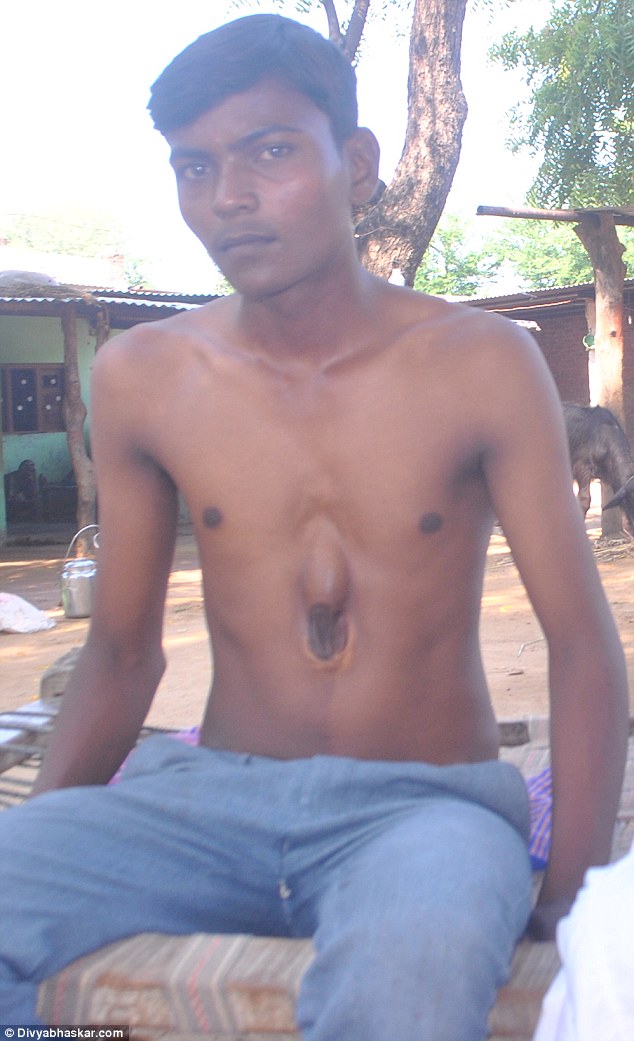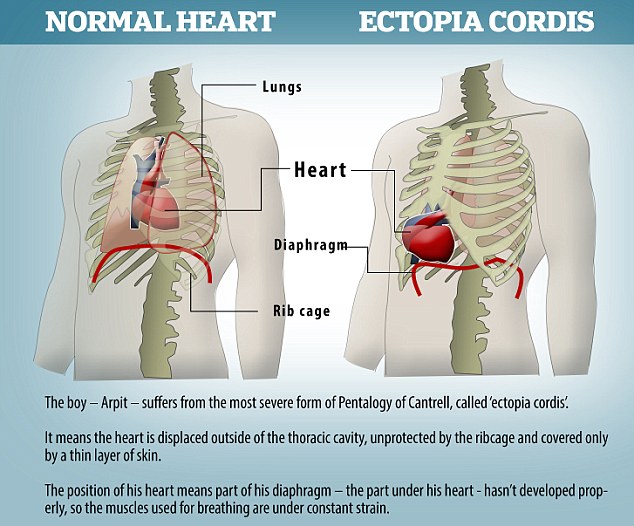
Medical Miracle ! The boy with a heart outside his body!
18-year old Arpit Gohil was born with his heart outside his rib cage, beating under just a thin layer of skin. Known as Pentalogy of Cantrell, the rare condition affects foetus development and causes babies to be born with vital organs (such as the heart or intestines) on the outside of their bodies. Most children with the condition would be treated with kid gloves, wrapped in cotton wool and refrain from unnecessary risks. This condition is rare and occures only in 5.5 for every million births!
Arpit, who was born with the most serious form of the disorder known as ‘ectopia cordis’ is only 1 of just 165 known cases of this disorder. Growing up, he appeared like any other boy, climbing trees and driving a tractor on his father’s farm 40km from Ahmedabad, in Gujarat state, India. ‘I don’t have any problems, and have got used to living with the condition now,’ he told Indian news site Daily Bhaskar.
As his heart pumps beneath the skin in his chest, he added: ‘I can do everything like a normal person and don’t have any trouble with my jobs on the farm, whether it be tilling the land, driving a tractor or riding a bike.’
However because part of his diaphragm doesn’t work, the rest of the muscles are working overtime.
This means that any other infection he might pick up, such as pneumonia, would be much worse for him than for a normal patient.
Dr Sanjeeth Peter, director of the Nadiad-based DDMM Heart Institute, warned that Arpit could die at any second. “He has learned to cope with the defect but he is very vulnerable, and we don’t know how much longer he can continue living as he does at the moment. But if he slips and falls, or he is bumped, it could do serious damage. He holds himself carefully to protect his heart but, and particularly because he works on a farm, it is not 100 per cent safe.”
As soon as their son was born at home in Chhapra, India, in 1997, Arpit’s s parents took him to hospital in Nadiad after becoming aware of his serious complaint. Doctors thought he had been born with two hearts, but a sonograph revealed he had one heart outside his rib cage. They told his parents Arpit had almost no chance of survival.
But his father, Vikrambhai, revealed: ‘Since he was little, my son has never experienced any complications. At times, I felt he was actually healthier than the normal boys of his age. So I never took him to a doctor. I never thought about having him operated on.’
Now Arpit is considering having an operation to move his heart into its correct position after reading of a similar case of a girl in China. On examining Arpit, Dr Peter discovered five defects including an abdominal disorder above his belly button and a defect inside his heart. ‘He is OK for the time being,’ said Dr Peter. ‘But he could develop respiratory problems or circulatory problems at any time, because the problem is putting so much strain on his body. I believe the best thing for him to do would be to go ahead with the operation. After that he would be able to lead a normal life.’
This defect kills most patients in hours
Pentalogy of Cantrell disorder affects the development of a foetus’ abdomen, and can involve the sternum, the diaphragm, the thin membrane that lines the heart (pericardium), the abdominal wall and the heart. Doctors estimate the defect affects just 5.5 in every million live births.
When the disorder affects the heart, it is known as ‘ectopia cordis’. This sees the heart either completely or partially displaced outside of the chest cavity – so it is not protected by the chest wall. In turn, this means the heart is incredibly vulnerable to damage as it is only covered by a thin layer of skin.
Because the heart has developed outside the rib cage, the infant’s chest cavity is normally too small and underdeveloped for the heart to be corrected immediately, so the child must spend its first few years under constant medical supervision. Pentalogy of Cantrell can also lead to underdevelopment of the lungs, breathing difficulties, and blocked blood vessels.
Infants are also at risk of developing widespread internal infections of the abdominal cavity. Although it was first described in 1958, the exact cause of the disorder is still unknown. Most cases occur completely at random, although several family cases have been reported – leading some researchers to suggest genetic factors may play a role. The oldest known survivor of ‘ectopia cordis’ is Christopher Wall, born in Philadelphia in August 1975. Only 50 known cases have reached the age of 12, with most dying just hours after birth.
Original Post on: Dailymail.co.uk
Image Credits: dailymail.co.uk, divyabhaskar.com


